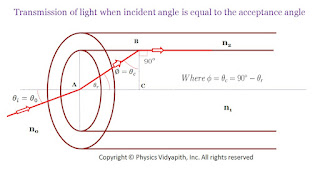Minimum Energy Or Zero Point Energy of a Particle in an one dimensional potential box or Infinite Well
Zero Point Energy of a Particle in an Infinite Well Potential Well:
The normalized wave function or eigenwave function:
$\psi_{n}(x) = \sqrt{\frac{2}{L}} sin \left( \frac{n\pi x}{L} \right)$
The probability density
$| \psi_{n}(x)|^{2} = \frac{2}{L} sin^{2} \left( \frac{n\pi x}{L} \right)$
The energy of a particle in a one-dimensional box or infinite potential well:
$E_{n}=\frac{n^{2}h^{2}}{8 mL^{2}}$
Where $n$ is called the quantum number and $n=1,2,3,4..........$ For $n=0, \psi_{n}(x)=0$ and $| \psi_{n}(x)|^{2}=0$. This shows that for $n=0$ $| \psi_{n}(x)|^{2}=0$ will be zero everywhere in the box which means that the probability of finding the particle inside the box is zero. i.e. particle is not present at all inside the box. Thus $n=0$ is not possible.
If $n\neq 0$ then $E \neq 0$. This means that the minimum energy of the particle in the box will not be zero. The minimum energy value will be obtained for the next lowest value of $n$ i.e. for $n=1$, which is
$E_{1}=\frac{h^{2}}{8 mL^{2}}$
This minimum energy of the particle is often called zero point energy which is finite inside the box. According to classical mechanics, the minimum value $E=0$ is also permissible.

